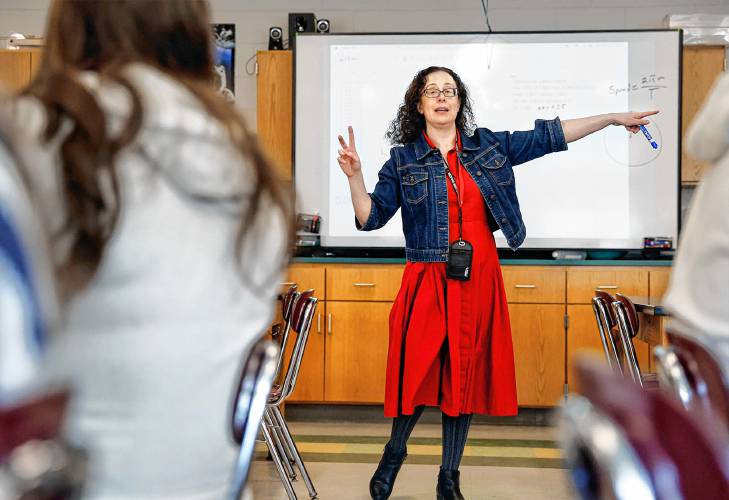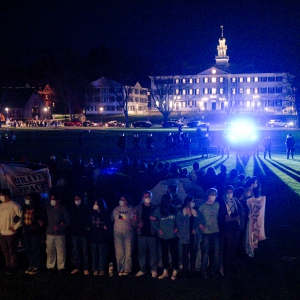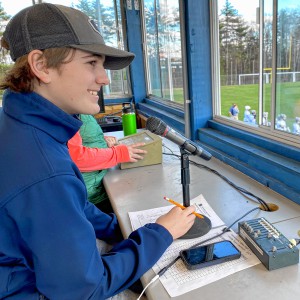Christa McAuliffe sabbatical recipient plans to launch students into space through escape room-inspired game

Bedford High School physics teacher Jennifer Baney is the 2024 recipient of the Christa McAuliffee Sabbatical Program. NEW HAMPSHIRE CHARITABLE FOUNDATION—Courtesy
| Published: 04-25-2024 3:03 PM |
When Christa McAuliffe boarded the Challenger space shuttle on Jan. 28, 1986, she planned to broadcast two lessons from space into thousands of American classrooms.
The first – called "The Ultimate Field Trip" – would have involved a tour of the space shuttle and a description of her daily life in orbit.
McAuliffe, of course, tragically never got to teach the lesson.
Now, nearly 40 years later, this year’s Christa McAuliffe Sabbatical award winner has fashioned a different approach to transport students to space.
Jennifer Baney, a physics teacher at Bedford High School and a self-described escape room fanatic, will spend the next school year building four physics-based, escape room-inspired classroom games, one of which will be set in a space shuttle.
“Let’s say you are a group of astronauts that are going to some distant planet and you were put to sleep to get there, but then suddenly you wake up and your ship is malfunctioning,” Baney said. “How do you get out?”
Students will have to use physics concepts in electricity and Newton’s laws to potentially dodge asteroids or navigate in zero gravity – all while a clock in the classroom ticks down.
The game and three others like it will push students to improve their collaboration and problem-solving skills, while at the same time increasing engagement in the content, Baney said in an interview.
Article continues after...
Yesterday's Most Read Articles
“Problem solving and collaboration are not things that are just natural to everyone. People need the opportunity to build those muscles,” she said. “Escape rooms naturally lend themselves to that.”
Baney got hooked on escape rooms about 10 years ago and frequents Lok’d in Manchester, often with her 18-year-old son. She said she immediately knew the concept would lend itself well to schools because it encourages teamwork and requires a creativity of approaches.
To convert the idea from a fixed space to a classroom activity, Baney plans to incorporate web-based activities, while at the same time retaining physical elements, such as UV lights and and lock boxes.
Each game will correspond to a physics unit – mechanics, energy and momentum, waves, and electricity – and will be free and publicly available online.
The mechanics-focused game will likely take place on the high seas.
“I’m assuming somewhere there will be pirates and you’ll have to find a treasure or or get a grappling hook to hit something or something like that,” Baney predicted.
Over the course of the year, Baney plans to test her games in various physics classrooms across the state with teachers who have already expressed interest.
Acknowledging that physics can sometimes feel “dry,” Baney sees the games as a way to foster interest, teach grit, and push more students into STEM fields.
“If we can challenge students in the right way and get them engaged, they're going to do so much more than if I just gave them a worksheet to do,” Baney said. “I'm looking to give kids problems that they really have to sit there and think about for a little bit.
“I think that’s a really important experience for kids to have to know that we can look at a problem, we can not know what the answer is right at the beginning, but have the confidence that eventually we’re going to get there and therefore we’re going to work through it,” she said.
Baney’s sabbatical is supported by the New Hampshire Charitable Foundation, which has funded the program since 1986.


 New Hampshire jury finds state liable for abuse at youth detention center and awards victim $38M
New Hampshire jury finds state liable for abuse at youth detention center and awards victim $38M Jurors hear closing arguments in landmark case alleging abuse at New Hampshire youth center
Jurors hear closing arguments in landmark case alleging abuse at New Hampshire youth center Update: Reactions for, against the more than 100 arrested at Dartmouth, UNH
Update: Reactions for, against the more than 100 arrested at Dartmouth, UNH Voice of the Pride: Merrimack Valley sophomore Nick Gelinas never misses a game
Voice of the Pride: Merrimack Valley sophomore Nick Gelinas never misses a game
